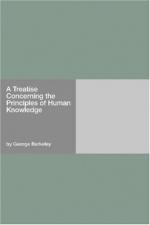130. Of late the speculations about Infinities have run so high, and grown to such strange notions, as have occasioned no small scruples and disputes among the geometers of the present age. Some there are of great note who, not content with holding that finite lines may be divided into an infinite number of parts, do yet farther maintain that each of those infinitesimals is itself subdivisible into an infinity of other parts or infinitesimals of a second order, and so on ad infinitum. These, I say, assert there are infinitesimals of infinitesimals of infinitesimals, &c., without ever coming to an end; so that according to them an inch does not barely contain an infinite number of parts, but an infinity of an infinity of an infinity ad infinitum of parts. Others there be who hold all orders of infinitesimals below the first to be nothing at all; thinking it with good reason absurd to imagine there is any positive quantity or part of extension which, though multiplied infinitely, can never equal the smallest given extension. And yet on the other hand it seems no less absurd to think the square, cube or other power of a positive real root, should itself be nothing at all; which they who hold infinitesimals of the first order, denying all of the subsequent orders, are obliged to maintain.
131. Objection of mathematicians.—Answer.—Have we not therefore reason to conclude they are both in the wrong, and that there is in effect no such thing as parts infinitely small, or an infinite number of parts contained in any finite quantity? But you will say that if this doctrine obtains it will follow the very foundations of Geometry are destroyed, and those great men who have raised that science to so astonishing a height, have been all the while building a castle in the air. To this it may be replied that whatever is useful in geometry, and promotes the benefit of human life, does still remain firm and unshaken on our principles; that science considered as practical will rather receive advantage than any prejudice from what has been said. But to set this in a due light may be the proper business of another place. For the rest, though it should follow that some of the more intricate and subtle parts of Speculative Mathematics may be pared off without any prejudice to truth, yet I do not see what damage will be thence derived to mankind. On the contrary, I think it were highly to be wished that men of great abilities and obstinate application would draw off their thoughts from those amusements, and employ them in the study of such things as lie nearer the concerns of life, or have a more direct influence on the manners.
132. Second objection of mathematicians.—Answer.—If it be said that several theorems undoubtedly true are discovered by methods in which infinitesimals are made use of, which could never have been if their existence included a contradiction in it; I answer that upon a thorough examination it will not be found that in any instance it is necessary to make use of or conceive infinitesimal parts of finite lines, or even quantities less than the minimum sensible; nay, it will be evident this is never done, it being impossible.




